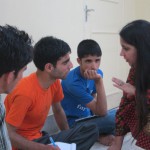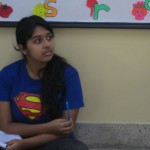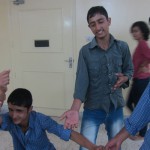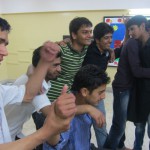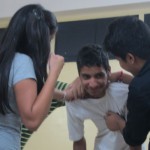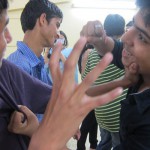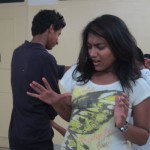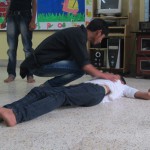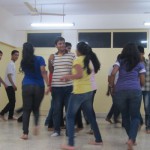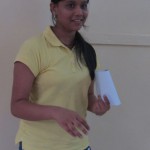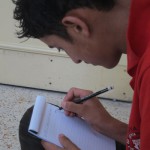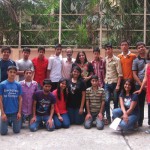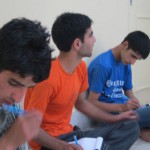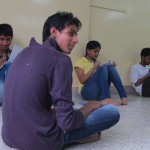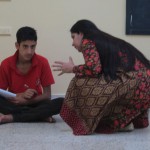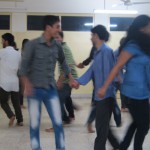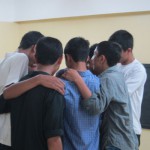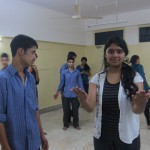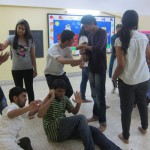Hold fast to dreams
For if dreams die
Life is a broken-winged bird
That cannot fly.
Hold fast to dreams
For when dreams go
Life is a barren field
Frozen with snow.
The sixth session of the Dialogue for Peace: Kashmir Project brought together students of Kolkata school Lakshmipat Singhania Academy (LSA) and a group of students from Kashmir among whom five were from Shehjaar and rest from rural areas of Kupwara and Bandipora.
LSA has been part of this project since its inception and this is the third time students have had the opportunity to participate—ensuring a certain sense of continuity and sustainability to the endeavour.
This session saw Ramanjit Kaur, theatre actor and founder of theatre school, Creative Arts, conducting the six-day long workshop that prompted the young adults to look into themselves—their memories, imaginations, belief systems and rediscover their selves by challenging some of these concepts—questioning some long held notions and pursuing long nurtured dreams. They opened up and gave expression to their deepest fears, thoughts and aspirations and in a week’s time each had a fairly good idea about life story of another. They bonded well with each other as well as Ramanjit, finding her to be personable, articulate and a patient listener.
Ramanjit had planned the workshop in great detail and yet she had made provisions to incorporate the feedback she received from the young adults. Perhaps it was this aspect that made the process dynamic and lively. On one hand, like a potter’s wheel, the workshop process made these young adults mould and sculpt their self-image and the way they perceived their friends by sharing their thought process with one another; on the other hand, the incisive discussions and debates made the participants confront their own inhibitions, fears and prejudices.
Many sensitive issues were discussed, while some stuck to their notions others showed signs of doubt and self-enquiry. In fact articulating one’s honest opinion and putting it up for discussion was an undercurrent throughout the session. Even when a few young adults articulated fiercely patriarchal or regional biases, they weren’t snubbed or silenced, rather Ramanjit and the Hakim Javed, the escort of the Kashmiri group, opened up a dialogue and invited others to participate.
One such instance was when the issue of women’s rights cropped up. The young adults from Kashmir were averse to the idea of their future wives being employed and independent. One among them, Wasim, argued that a precept in Koran informs that to live off the earning of one’s wife is sinful. Ramanjit intoned the precept stressing on the phrase ‘living off’ and suggested that living off anyone’s income should be sinful! Javed offered that religious books were only a guideline and should be changed according to the need of the society. Rajeshwari, a student from LSA, thought that those who wrote the Koran were human beings just like them and hence as fallible as the rest. She suggested that these words shouldn’t be binding; they should always be open to questioning and interpretation. Then the two boys from LSA related how they would want their women to be educated and independent. The girls brought in their perspective and Rajeshwari stressed that she wanted to work for United Nations and go to poor and depressed countries of the world and promote the rights of women especially the right of a woman to be independent.
The issue however had a deeper resonance for the young adults from Kashmir. Most of these young adults are ‘orphaned’, a concept which has a different import for a Kashmiri child. There, a child who has lost his or her father is considered to be a yakim (or an orphan) even though the child’s mother may be alive. The mother is rendered redundant because, in rural Kashmir, women are usually illiterate and consequently unemployed. They are not equipped to support their families after the death of the male breadwinner. Women are usually the ones who are left behind to bear the brunt of violence and survive harsh realities. Had the community allowed them to earn they too could have fended for themselves and their family. Unfortunately, even this argument did not change the mind-set of some of the young adults form Kashmir. Though, after the session they were, at the very least, aware of an opinion other than one held by them or their community. The session introduced them to the opinions of their peers from beyond the valley. This exposure may have been the reason why a few of the boys admitted that they wanted to educate their future wives. This brings to life the hope that perhaps a longer engagement may help bring a broader perspective.
However prejudices were only one of the many things that were discussed in an open forum. Ramanjit made them share most of their ideas and reflections, and even their responses after playing the games or being part of a particular theatre exercise, in open. So, even the games that they played had an impact on their thought process and in their diary entries they often attempted to see the deeper meaning in the simple games. Tahir, for instance, wrote that while playing a game called ‘tag 3’ in which he had to run and catch someone or alternatively dodge when being chased, he had realised that agility of body and mind were quintessential to theatre as well as life. He further added that it was only later that he realized that had he not played with his friends in a small space, he would have never been able to overcome his shyness and make friends with ‘total strangers’. Thus, participants ended up drawing essential theatre and life lessons from the games. The vocabulary of theatre: space, gestures and expression, body as vehicle so on and so forth had become clear to them through the games and theatre exercises. Although they were hungry for more—at the end of the session many confessed that they wanted more theatre lessons and more such workshops, as they were keen on taking up theatre seriously.
However, Ramanjit was not interested in teaching them ‘acting’. In tune with the PeaceWorks mandate of the Dialogue for Peace project, she was focussed on using the power of theatre to address multiple issues at several levels. Alternating between intensely physical games and quiet introspection, the workshop touched many sensitive cords and built strong bonds between the two diverse groups.
The young adults were asked to close their eyes and listen to music. And while they were thus engaged, Ramanjit would often ask them to reflect on their fears, their aspirations in lives, their memories from their childhood or their imagination of the future. She called this particular exercise shavasan. In one such exercise she had asked the young adults to write their fears on a piece of paper. The unnamed paper was then exchanged amidst the group and everybody’s honest confession of their fears came to the discussion forum. Fear of death and aftermath; fear of failed goals or relationships; fear of not achieving or losing out; fear of manmade and natural calamity; plagued these teenagers. Listening to their fears it seemed as if mature beings were speaking in the voice of sixteen and seventeen-year olds. This had a very cathartic effect on them as till the very last day they would recall this game in their discussion sessions and confess that sharing their fears and then tearing it to pieces made them feel liberated from its overbearing power. As some young adults confessed very traumatic experiences, like someone from Kashmir feared death by bullet as he had seen his father take a bullet and die. When this particular chit was read out the entire room was quiet and contemplative; for the participants from Kolkata, who have led an ensconced life so far, this was very new as they were now hearing personal confessions about fears of living in a conflict zone. Thus, these forums opened them to each other’s experiences and plurality of lived experiences and worldviews.
Through this intense and rounded theatre workshop process, young adults were able to map their life in a certain sense. Ashique from Shehjaar confessed that he had a difficult past and its experience had made him dislike Hindus and people from other religions, yet through the workshop he had met people from different religions who did not ill-treat him rather everyone welcomed him with open arms. This made him question his preconceived notions about Hindus and he admitted that he then felt, albeit marginally, relieved from the past and hopeful for the future. The week in Kolkata made him think about his aspirations and he was returning with the realization that being optimistic and having the ability to dream is the key to a better future.
It was a long time ago.
I have almost forgotten my dream.
But it was there then,
In front of me,
Bright like a sun—
My dream.
And then the wall rose,
Rose slowly,
Slowly,
Between me and my dream.
Rose until it touched the sky—
The wall.
Shadow.
I am black.
I lie down in the shadow.
No longer the light of my dream before me,
Above me.
Only the thick wall.
Only the shadow.
My hands!
My dark hands!
Break through the wall!
Find my dream!
Help me to shatter this darkness,
To smash this night,
To break this shadow
Into a thousand lights of sun,
Into a thousand whirling dreams
Of sun!

